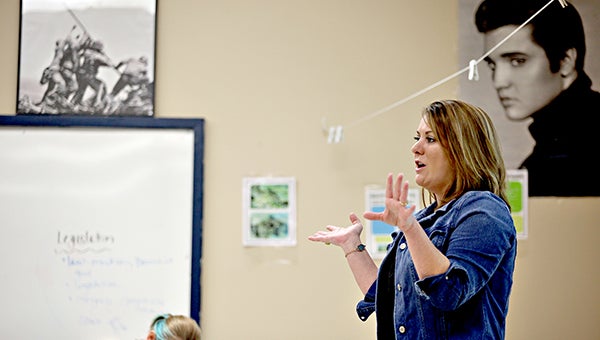Teaching 9/11: It’s about connecting dots
Published 8:58 pm Saturday, September 10, 2016

- IN MEMORY: Warren Central High School teacher Chrissy Brewer explains an assignment about the September 11, 2001, terrorist attacks to her 11th grade U.S. history class Friday.
The Twin Towers crumbled. The Pentagon stood misshapen and a field in Pennsylvania will remain forever scarred.
Our nation watched in horror as the sense of security we once took for granted was forever altered by hijacked planes on Sept. 11, 2001.
And the students in Warren Central High School teacher Chrissy Brewer’s 11th grade United States History class have no memory of those events. To them, 9/11 stands as a more tangible history than the Civil War—but pure history nonetheless.
“All they know is what they’ve picked up from the news, online or from their parents. They have no memory of it,” Brewer said. “In the past, students had a lot more knowledge of what happened. Now a lot of them know bits and pieces and it’s about connecting those dots so they get the whole picture.”
Brewer’s class of 26 spent their 90-minute class period Friday watching video clips from the History Channel online that depicted the fateful day’s events.
She addressed conspiracy theories and asked questions, including “Can you imagine that happening it real time?” and “If you were on the plane, what would you have done?”
They followed the videos with an in-class activity connecting dots between the events of 9/11 and current news, such as the connection between the freedom of speech and the terror attacks. Their homework is to interview someone over the age of thirty about the events, asking questions like, “Did it change their life? If so, how?”
Brewer said the events obviously deserve more than a lecture.
“It means more to you as a teacher because you’ve lived history. You don’t want it to just be a small paragraph in a book,” she said. “You always want to make history relevant and make connections. Their curiosity is piqued because their parents can relate. They like to hear those personal stories. It’s something that they can relate to.
“There are some light bulb moments,” she said. “There are just so many good resources to use out there.”
Students in her class on Friday asked questions ranging from how bodies were identified in the ruble to where the ruble was taken to what kind of artifacts were preserved.
“I’ve had a student ask if there were actually people in the planes,” she said.
Brewer said she spends a day to a day-and-half on the subject and covers aspects of the event that fit into one of the areas the state test covers: global affairs, domestic affairs, economics, culture and civil rights.
She said she views her job — she’s been teaching U.S. history for three years and history for 12 — as connecting pieces of information and relating them to current events and noted that though her students don’t remember where they were when they heard about planes hitting the Twin Towers, the events do impact them through their parents, who may be deployed overseas, or the reason why some of them might one day be serving overseas if that’s the path they choose to follow.
“You want them to be good citizens,” she said, “and if they don’t know why something happened or how it’s connected, it’s hard for them to be.”





